Magic in Colombia: From Gabriel Garcia Marquez to Ghost Stories
A compilation of ghost stories I've collected since I moved to Colombia, the home of magical realism.
I first started associating Colombia with magical realism during my A-level English literature class at school in 2002. Before Shakira and Sofia Vergara stole his thunder, Gabriel García Márquez (or “Gabo”, as he is affectionately known here) was probably the most famous Colombian in the world. He was a Nobel Laureate and one of the founding fathers of magical realism in literature.
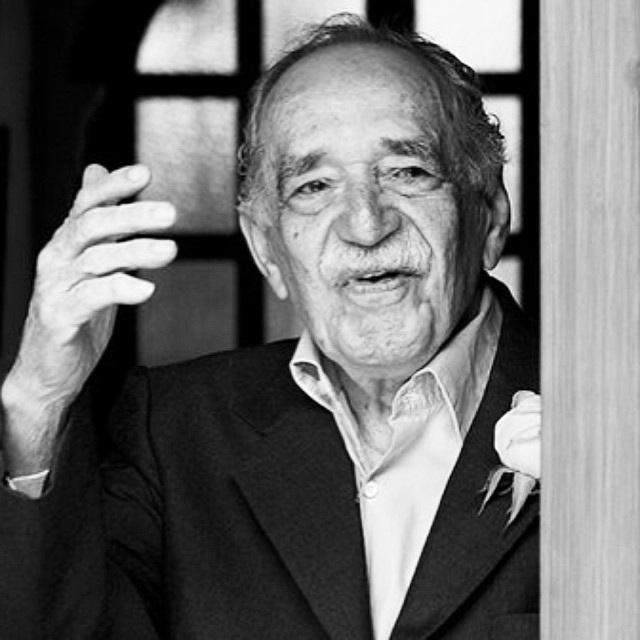
One of his greatest pieces of fiction was One Hundred Years of Solitude. It is a story of magic and superstition, of seven generations of the Buendía family who live a small, rural, fictional Colombian town called Macondo. History repeats itself again and again through the generations and the haunting past is evoked by ghosts who return to visit the characters. The names Aureliano, José, Arcadio, Ursula, Amaranta and Remedios are repeated from generation to generation and it is easy to lose track of who’s who. Incestuous relationships result in children born with pigs’ tails. One member of the family is so beautiful and wise that one day she ascends directly to Heaven without even dying. This is the magic of fictional Macondo, which could arguably represent any Colombian village at any point in time.
People often turn to literary greats to learn more about a country, its culture and its history. So what can a book full of magic, ghosts, and children born with pigs’ tails teach you about Colombia? I asked myself the same question at aged 17 in Mr. Amy’s post-colonial literature class. Gabriel Garcia Marquez was one of many authors we could look at as part of our A-level English literature module and Mr. Amy had been raving about One Hundred Years of Solitude since the beginning of the school year. I looked for it in the local library but unfortunately they didn’t have it, so I chose a different book to study for my exam.
It would be fourteen years before I would download Gabo’s masterpiece to my Kindle and finally read it. After two years of living in Colombia, I understood the novel’s pertinence in a way I never would have had I attempted to read it when I was 17. Gabo once said: ‘there’s not a single line in all my work that does not have a basis in reality.’ When I think of the experiences I’ve had in Bogota over the course of nearly six years, I now understand how the line between the real and the supernatural might become blurred.
Magical realism on a Bogota bus
For me, it happened on a Bogota bus in February 2014, shortly after I had started working as an English teacher at the British Council. I lived in Normandia in the west of the city at that time, and the British Council was on the east side. This meant a daily commute of at least an hour and fifteen minutes each way, invariably spent standing on a decrepit old bus, which would cough out black smoke each time the driver changed gear. Bus journeys in Bogota were always bumpy and jolty, and this particular journey had been excruciatingly slow, accompanied by a commotion of clunky vehicles honking their horns from all sides.
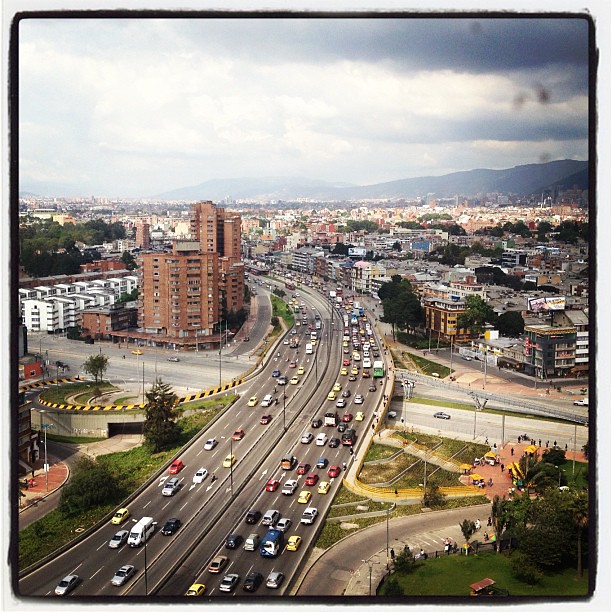
I sighed and rolled my eyes. “What do these drivers hope to achieve with all this racket?” I wondered irritably. “Do they really think that honking their horn will make the traffic move faster? Do they believe that this cacophony will somehow endow every vehicle with magical properties which will allow them to levitate over the bus crash up ahead??” In my frustration, I took out my phone and updated my Facebook status with exactly these thoughts. A short time later, one of my former Spanish tutors from university commented, “Well, in the land of magical realism, all of that might just happen!” I remembered this comment as I started to think more about Gabo and magical realism.
In Colombia, everyone has a story to tell about magic
“I realized that life itself is the greatest source of inspiration and that dreams are only a very small part of that torrent that is life”, Gabo had said in an interview with The Paris Review in 1981.
Maybe it was true, then, that magic and every-day life were inextricably linked in Colombia. I wrote about this bus journey for an anthology commemorating Gabo’s life in 2015, Was Gabo an Irishman? Tales from Gabriel García Márquez’s Colombia. The anthology is filled with stories of magic, superstition, and the paranormal. All the contributing writers had spent time living in Colombia. There were stories of Colombians who spoke to paintings of their dead ancestors when they wanted to ‘catch up’; witches in mango trees; spells cast in revenge. And, of course, ghosts.
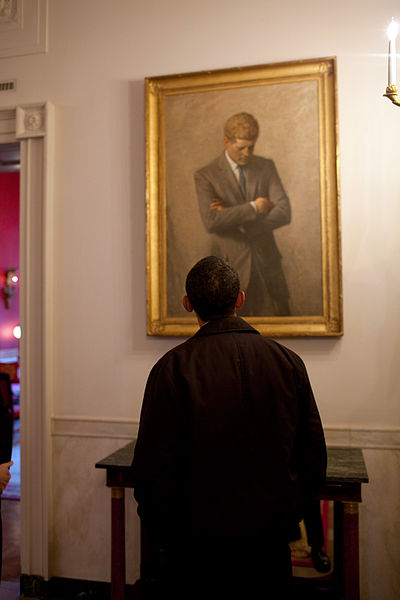
It is a fascinating read and a suitable homage to the man who inspired it. It is not that these stories offer irrefutable evidence that magic is real in Colombia, but the book helps to demonstrate why many Colombians are superstitious and why everyone who spends time in Colombia has their own story to tell about magic. And in my experience, EVERYONE has a story to tell. Even those who say they don’t believe in God, ghosts or the supernatural. Here are a few more stories of magic in Colombia that I’ve heard during my six years of visiting and living in the country.
The Last Goodbye
At the end of 2016, a member of the extended family in Bogota was dying from cancer. His name was Alex and my boyfriend’s Aunt Gladys lived in the same building as him and his young family. She and her family lived on the first floor and Alex and his family lived upstairs. One day, when Alex was in hospital and nearing the end, Gladys was at her friend Betty’s house, who also knew the family well. She and Betty had been upstairs having coffee when suddenly there was a crash in the kitchen downstairs, like the sound of a plate falling from the counter and breaking, Gladys told me. Startled, they both went down to investigate and found nothing. Everything in the kitchen was as they had left it. While they were in the kitchen, they heard a noise upstairs, like the sound of an open window banging closed in the wind.
“Did we leave the window open?” Gladys asked.
They went back upstairs, but all the windows were locked shut.
Gladys stayed for a while longer before heading home. Betty walked her to the bus stop and while they were waiting, Gladys’s daughter Laura called her in tears and told her that Alex had died. On the bus home, not long after they had said goodbye, Gladys got a call from Betty.
“Gladys, remember the noise in the kitchen and the windows?! Maybe it was Alex saying goodbye!”
And to this day, Gladys and Betty remain convinced that those unexplained noises in the house had been Alex’s last goodbye. I’ve discovered that it’s quite a common belief in Colombia that people find ways of saying goodbye to their loved ones when they die.
Do atheists believe in ghosts?
I wondered whether this belief in the supernatural had anything to do with the fact that most Colombians were devout Catholics, and as such, believed in life after death and the mysterious ways in which God worked. I decided to put this theory to the test. My boyfriend Javi is an atheist and believes that physical death marks the end of life – there is no ‘after-life’. I asked him if he had ever had any supernatural experiences, expecting him to scoff and say ‘no’. But he hesitated, and then told me a story of something strange that had happened when he and his younger sister Sonia had been at home alone at the ages of 12 and 14.
They had been upstairs watching TV and their parents had gone out to do the shopping. At some point, they heard the familiar sound of a plastic bag full of shopping being placed on the table in the hall downstairs, and the sound of one of the chairs scraping against the tiled floor, as if someone were pulling it out to sit at the table. At first, they thought that their parents had arrived home. The odd thing was that they didn’t hear any voices. Javi bent over the rail at the top of the stairs and called out to his mum. Nothing. By this time, both he and his sister were spooked. Javi grabbed his tennis racket and started down the stairs, with Sonia following closely behind. He called out and walked to the table in the hall. There was nothing and nobody there, but they both knew what they had heard. Without further hesitation, they both ran from the house and waited outside until their parents came home.
Naturally, when their parents arrived they didn’t believe a word of it.
I asked Javi if he thought there could have been any logical explanation for what he had heard; could the noise have come from a neighbour’s house, or from outside? No, he said. The noises he and his sister had heard were the types of noises that you hear every day at home – they recognised the sound of the bag being placed on the table, of the chair being pulled out. Besides, the noises had definitely come from inside the house. I asked Javi’s sister Sonia about his story, and she confirmed his version of events.
A ghost in the graveyard
Later, I asked Javi’s mum, Rosa, why she hadn’t believed them at the time. She smiled and gave a sort of shrug and said, “because there wasn’t anyone else in the house.” Like her sister Gladys and indeed most Colombians, Rosa believes in God and evokes Him regularly throughout the day. I’ll ask her how she is, and she’ll reply “Bien, gracias a Dios” (“Fine, thank God); I’ll tell her she needs to start saving so she can go on holiday with us next year and she’ll say “Yes, God willing”; and every time Javi leaves the house, she’ll trace the sign of the cross in the air and say, “God bless you and protect you”. So I found it difficult to believe that she was a skeptic when it came to the supernatural.
“Haven’t you had any supernatural encounters?” I asked her.
She thought for a moment, pursing her lips. “No…no…I don’t think so… Oh, well there was that time in the cemetery when I was a little girl…”
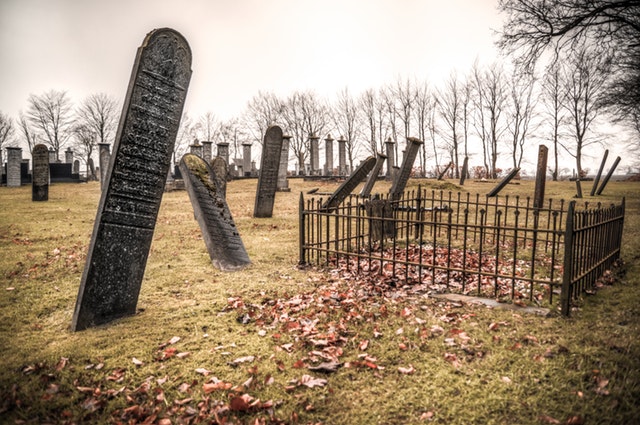
She had been visiting her grandmother’s grave with three friends when they had become distracted and started running over the graves chasing each other. Suddenly, a tiny old man appeared before them. He had a stick, wore a ruana (like a poncho) and a large hat, and was walking among the graves some distance away. Startled, the girls ran to the cemetery gate. They had definitely left the gate open, but now it was closed. When they turned and looked back, the old man was gone and the gate had swung open. Rosa and her friends fled in terror.
“Couldn’t he have just disappeared behind one of the graves or something?” I asked.
Rosa smiled and shook her head. “The thing is, there was nothing that could have hidden him; nowhere he could have disappeared to in the time it took us to run to the gate.”
When she got home, Rosa told her mother what had happened. After scolding her and telling her what a load of nonsense she was talking, her mother – somewhat contradictorily – said, “That’s God’s way of punishing you for playing where you shouldn’t have been playing!”
Uber-natural
I started to wonder whether any random person I spoke to in Colombia would have a story to tell. One day in an Uber on my way across town, I decided to find out.
“Have you ever had any supernatural experiences?” I asked the driver.
“You mean like ghosts and spirits?” he asked.
“Yes, or anything out of the ordinary.”
He told me that not much had happened to him, but that he was from a village just over the eastern mountains, not too far from Bogota by car, and that his ancestors had told him plenty of stories.
Colombian Ghosts
Before I start relating any of these stories, I should preface them with a short explanation about Colombian ghosts. In Colombia, ghosts are a bit like celebrities; they have well-known names and are easily recognizable if you are unfortunate enough to happen upon one of them.
El Mohán is a ghost associated with water; he haunts the seas, the rivers and is often a premonition associated with natural disasters such as floods, landslides, and earthquakes. He is covered in hair, has long nails and lives in a subterranean palace carpeted with gold throughout, with a large collection of precious stones. There’s also la Llorona (the Crying Woman) who often appears when someone is up to no good, el Sombrerón (the Man in the Hat), la Patasola (the One-legged Woman), among many others, and each one tends to haunt some regions more than others.
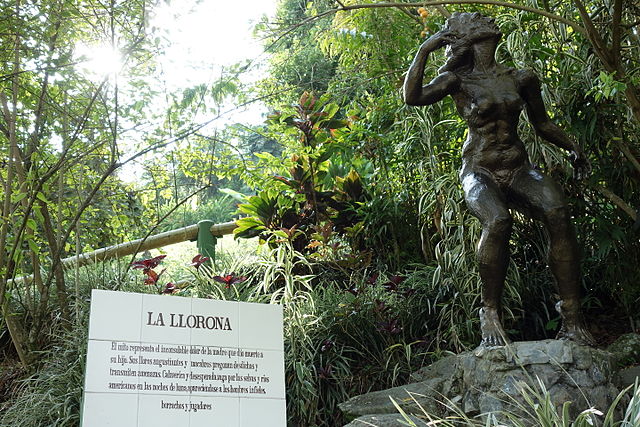
When things go bump in the house…
So, back to the Uber driver. His first story was not dissimilar to a couple of the other stories related above. It turns out my question had started to conjure up memories and that he had in fact had some strange encounters. He was in his bedroom at home, he said, and his wife had been due to arrive home from work. Suddenly, he heard the familiar sound of the front door opening, keys on the table, and someone opening the fridge. He called out to his wife but there was no response. He went downstairs to find everything in order… but his wife was nowhere to be seen. Sometime later, she did arrive home, and he couldn’t be sure whether or not he had just imagined the sounds.
“I suppose you might have been dreaming,” I suggested.
“Hmmm… but I wasn’t asleep.”
“Strange… have you had any other supernatural experiences?”
He said that in the city, people tend not to have as many stories to tell, as most of the ghosts appear in the countryside.
A rude awakening
“Once when I was visiting my grandma in the countryside – I suppose I was about 14 or 15 – I was attacked by a ghost.” My Uber driver recalled that he had been sleeping when suddenly he awoke in the middle of the night and felt something strangling him. He fell out of bed as he struggled to free himself from this ghostly grip around his neck. As he rolled around on the floor in desperation, his grandma came to see what all the commotion was about.
“What’s going on, mijo?!”
“It’s trying to kill me! I can’t breathe!” he gasped in panic.
“Well pray, mijo! Pray to God to free you from this evil spirit!”
He said he started praying hard and eventually the grip around his neck loosened and he was free.
“Remember to pray whenever you’re in trouble, mijo. God is always watching over you.”
The rational side of me thought that he was probably just suffering from night terrors, though I didn’t say this out loud. It also surprised me that he hadn’t immediately recalled this encounter as soon as I’d asked him about his experiences with the supernatural. I asked him if any of his ancestors had ever told him stories about their experiences with the supernatural.
And then things got bizarre.
A demon in the forest
The driver told me about a time his grandfather had been out hunting in the forest with his brother when they were young men, and had ventured so far from home that they had had to camp for the night in the forest. They had lit a campfire and settled down for the night. In the middle of the night his grandfather was awoken by a rustling sound, and as the forest was home to various wild animals, he reached for his rifle. The fire was down to a few glowing embers so they couldn’t see far beyond the nearest trees. Suddenly, a figure started to materialize before them, furious and menacing. It was a ghost they had heard about before (I forget his name now), a large beast covered from head to toe in grass. It bore down on them both, leaving them no choice but to fight for their lives through the night. As the sun began to rise, the beast retreated and the men realized they had won the battle.
No harm, no fowl…
As I contemplated the image of a grass-covered monster attacking my Uber driver’s ancestors in the forest, wondering whether they had perhaps been a little too fond of the drink, the Uber driver moved on to his next story, involving these same ancestors. His grandfather and his great-uncle had been traveling on foot to another part of the region to pick up supplies. They were walking along a dirt road when a man and his donkey carrying a container of live chickens passed them by. The cart was already some 100 meters ahead when, unbeknownst to the driver, one of the chickens somehow escaped. After the men caught up to the chicken, they decided they would slaughter it and take it home for dinner. But little did they know that this was no ordinary chicken.
“Bring me to the farmhouse two kilometres from here and you will receive a week’s worth of groceries as a gift for helping me.”
For the first time in the conversation, I felt my mouth fall open slightly. A talking chicken. Wow.
As they were going in that direction anyway, the two men continued down the road, chicken in hand, until they reached a farmhouse (indicated by the chicken). The men knocked on the door and when it opened the chicken jumped out of my Uber driver’s grandfather’s arms and ran down the hallway out of sight.
“Buenos dias, muchachos,” the lady said. “I have something for you.”
She disappeared into the kitchen without inviting the men in, and returned with a box full of corn, rice, oranges, avocados, eggs, blackberries, bananas, some unroasted coffee beans, among other things.
“Thank you,” she said. “God bless you and protect you.” And she closed the door.
“So that’s what happened,” my Uber driver said matter-of-factly, looking at me briefly with raised eyebrows before turning back to the road.
I asked the driver why his grandfather hadn’t taken the chicken to a market and sold it. “Surely a talking chicken would have been worth a lot more than a box of groceries?” I hypothesised. Now there’s a sentence I never thought I’d say.
The driver shrugged. “Maybe. But what if the chicken had stopped talking by the time they reached a market? The people would have laughed at them and they would have been left with just a chicken instead of a week’s worth of groceries to feed their families.” I couldn’t fault his logic.
“Actually,” he added, “I think they were just curious about what would happen once they reached the farmhouse.”

“Things have a life of their own… It’s simply a matter of waking up their souls.” (Spoken by Melquiades in One Hundred Years of Solitude).
The Uber car had been navigating the winding roads out of the city and ascended higher into the Andes as it approached the university where I’d shortly be speaking in front of a class of students. As I reached out to open the car door and exit the car after 45 minutes of Colombian ghost stories, I paused and turned back to the driver.
“Why is it that every Colombian I speak to has a story to tell about ghosts and the supernatural, but nothing like that has ever happened to me?”
The driver cocked his head to one side in contemplation. “Well, I don’t know. Maybe you just haven’t been paying attention.” He said smiling. I smiled back and nodded slowly as I walked away from the car. Suddenly, children born with pig’s tails didn’t sound so unlikely, after all.
Have you heard any fascinating stories of the supernatural during your time in Colombia? Pray, do tell in the comments section below!
If you have found this blog post informative or entertaining and would like to support How to Bogota, you can buy me a digital cup of coffee!
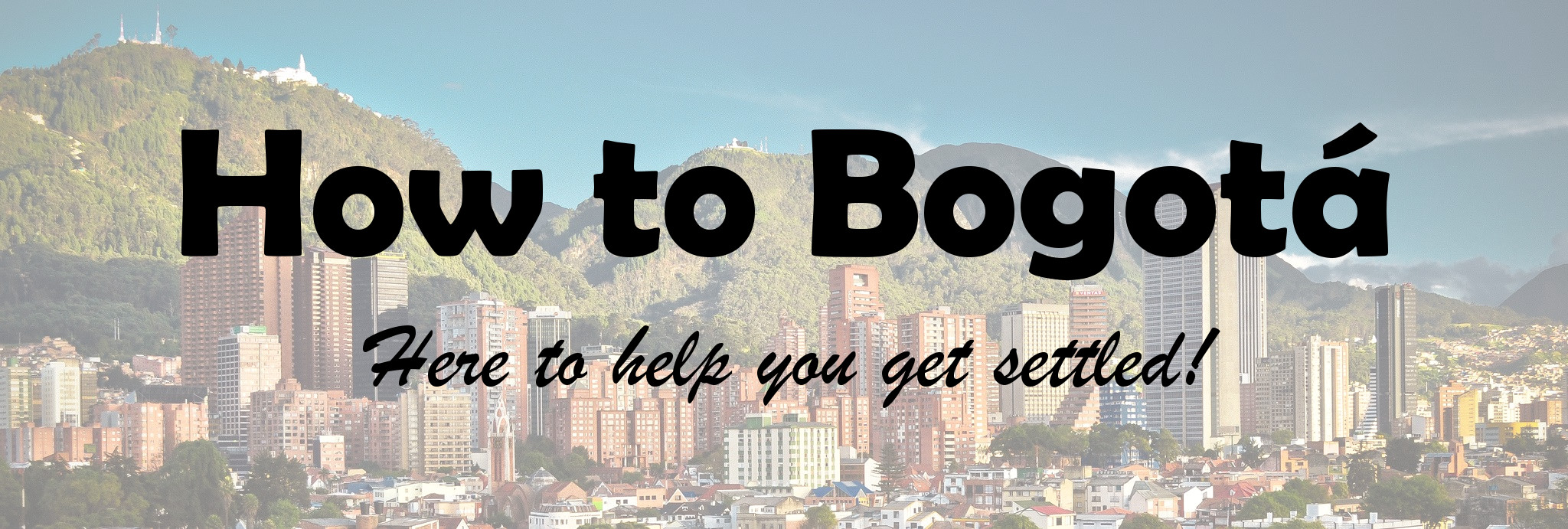
Definitely an interesting topic worthy of further exploration. My wife has a few stories about ghosts and witches and the afterlife, if you would permit me the telling of one of them?
She has always had a special relationship with her grandfather. A few years ago, he had a cardiac arrest and was rushed to hospital, where he was operated upon. She had no idea – was asleep in another part of the country. But she dreamt lucidly that she was sat in his sitting room when he came in and sat down beside her, in order to explain that it was his time to go. She pleaded with him not to go. Told him that he was still needed. Eventually convinced him to stay. Later, at the hospital, after everyone else had left the room, he took her hand and told her: “I had left, but you convinced me to stay. I stayed for you.”
A couple of years later, soon after he did finally pass away, she again had a lucid dream about him. She asked him how things were going, now that he had died, and he replied that although he had died there was something stopping him from passing on fully: “Something that I still have left to me to do before I can move on. One last thing to do.” (For my part, I listened, but internally dismissed it as the longing of a granddaughter in mourning for a grandfather she desperately wanted to stay.)
We forgot about this until another few months had passed. I had moved back to London for work and she had just joined me. And she had one last lucid dream. This time he told her that he had met our daughter, that she was perfect, and that he was sending her to us. Some weeks later we found out we were pregnant – indeed, had become pregnant that very night – and the grandfather, presumably with duties fulfilled, hasn’t been dreamed of since. Our daughter, meanwhile, is due to be born in October.
I don’t know whether that fits into the category of the supernatural, but it’s something that I cannot rationally explain and greatly suspect would not have happened in the UK. I have long since reconciled myself to the fact that even if something does not make sense, it does not mean you get to fuck around with it.
P.S. Hey Naomi! Great to have you back in my inbox ?
Thank you Robin, it’s great to be back! Thank you for sharing your wife’s story – I find it entirely believable in this magical country! And congratulations on your impending fatherhood! I went to a fascinating exhibition on the lower level of the Museo del Oro today, about the tradition of midwifery among the Afro-Colombian communities of the Pacific coast. Really interesting considering midwives aren’t typically used in the developed parts of Colombia. I hope you are both well (back in London?) and wish you all the best!
Thanks! We’re very excited. Andrea has already gone back to Colombia and I’ll be following next month, so baby will be made in London but born in Bogotá. That sounds like a very interesting exhibition – I’ll have to check it out when I arrive! It is surprising that the Colombian healthcare system doesn’t seem to have a space for midwives, despite their role in both traditional and more developed societies elsewhere.
That story is one of several Andrea has, and I’m sure one of thousands we could talk about and marvel at. You’re right that the country is magical, at least in the sense that it upsets my metaphysics and makes me doubt everything I thought was true about the way the world works. If you were to write a book about magic in Colombia, collecting and cataloguing stories (be they benevolent or vengeful, seductive or chicken related), and investigating from a respectful outsider sociological perspective their meaning but leaving the magic intact (for instance: is it the violent melding together in one culture the seemingly juxtaposed Catholic, indigenous and African belief systems, or something more?), it would probably fill a gap in a lot of expats’ curiosity. Just sayin’…